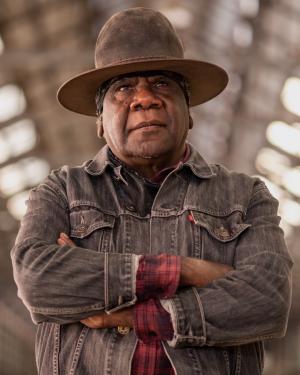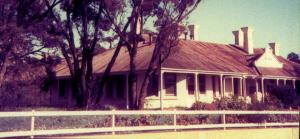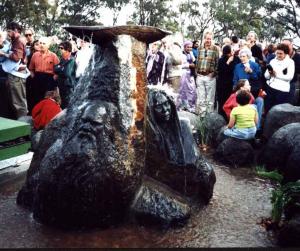Wangkangurru man Mungathirra speaks with Nisha Karyn about why Black Lives Matter in Australia.
'We need a voice, a whole lot of voices'
Just days after the death of George Floyd at the hands of police in the US on 25 May, 2020, a young Aboriginal boy was tripped, arrested and pinned to the ground by a police officer in Surry Hills, Sydney. ‘When that happened, the policemen said that they had a bad day,’ said the boy’s father, Mungathirra, 60. ‘I said, we as Indigenous people have bad days every day when the cops arrest us. Where do we have the freedom to be who we are in this country?’
Sydney. ‘When that happened, the policemen said that they had a bad day,’ said the boy’s father, Mungathirra, 60. ‘I said, we as Indigenous people have bad days every day when the cops arrest us. Where do we have the freedom to be who we are in this country?’
The boy’s teeth had been damaged and he was taken to St Vincent’s Hospital after the incident to be x-rayed.
Weeks later, Mungathirra’s youngest daughter was arrested for walking a red light in the same area, while the people she had been following across the road had been ignored. Both teenagers are still getting over the anxiety and trauma.
'As my children were going through this drama, what happened to them deeply affected me as a father because of intergenerational trauma,’ said Mungathirra. ‘It deeply hurt me within myself, this whole thing of police harassment and systemic racism. As Aboriginal fathers, we love our sons and daughters and want them to have a good future.’
Mungathirra, a Wangkangurru man and a friend of IofC Australia, was asked to speak at Australia’s Black Lives Matter protests, which took place between 1 to 5 June this year. There, he addressed the issues he and his family had faced in relation to displacement and police treatment of Indigenous people in custody.
The Royal Commission into Aboriginal Deaths in Custody, published in 1991, reviewed 99 Indigenous deaths in custody in the 80s. The Guardian newspaper published new data this year to show that, since then, there have been 434 more Indigenous deaths in custody.
Reflecting on his Black Lives Matter speech, Mungathirra said, ‘I think we need a voice, a whole lot of voices. Mine is the voice of many crying for justice and land rights above oppression. We were giving one to the dead who can't speak no more, and the young generations to come. The protest gave us a voice on a national level and a chance to speak our minds.’
'Mine is the voice of many crying for justice and land rights above oppression.'
From cattle stations to forced labour
Mungathirra’s parents were one of the last ‘station blacks’ of Australia. On a cattle station at the border of South Australia, his mother and father worked for tobacco, tea, flour, sugar and clothes instead of money.
‘It was a bit like slavery, you can hear it in the term. We had a lot of cattle at least, so there was something when we ran out of meat,’ Mungathirra explained. ‘I enjoyed that life and have a vivid memory of that place.’
In 1967, when he was seven years old, often sporting oversized hand-me-downs and wild, shoulder-length hair, policemen and welfare workers paid the pastoral property a visit. The welfare workers, tasked at the time to ‘protect Aboriginals’, collected the family off the farm and packed them off to work on railways in Marree instead.
‘They put us at the back of a truck where cattle usually are transported and took us to reserves that were already set up for Aboriginals. We were the last to live in the bush area and in that farm freely. They wanted us separated from all that.’
When they arrived, the family was greeted by welfare workers, policemen, a nurse and a doctor. They were checked for diseases and lice, washed in open baths, given new clothes and had their old ones burnt.
‘They burn the clothes to say, “You don’t live there anymore, you don’t have your free land.”
Each Aboriginal person was also registered. Having been born outside a hospital with no concept of date, Mungathirra and his peers did not have birthdays. They were each given the birthday of 1 July to follow the financial year, and had their identities documented. And then Mungathirra and his cousins were taken to school.
‘They took us around to the toilets on our first day. They had a fountain where you could washyour hands and drink out of. They had us stripped off, bent over and washed our hair because they were afraid of lice.’
The teachers rubbed into his scalp hard and cut his hair violently, Mungathirra started bleeding. His hair, from shoulder-length and wild, was now patchy and short.
‘I don’t know what stuff they used but it stung my eyes. I was frightened.
‘We didn’t speak English properly. We spoke in our language and the other kids didn’t want nothing to do with us. They would chase us after school every day right across to the other side of the railway line with stones and that. We would run home from there crying.’
But above all, weekends were days they dreaded the most. At night, when pubs closed, White men would come to Mungathirra’s neighbourhood and rape the women.
‘The policemen wouldn’t do anything…when we told the missionary, they would take us kids away for the weekend. And on Sunday we would go back home. We would see people with broken jaws, all bandaged up.’
Becoming part of the ‘Stolen Generation’
After a year in Marree, the neighbourhood’s welfare workers were getting frustrated at the children’s resistance to Western cultural influence. That was when Mungathirra and his cousins joined the list of names in the Stolen Generation, who suffered Australia’s notorious efforts to improve Aboriginal adaptation into European-Australian society.
‘We were still around our mothers and grandmothers and we still had our Aboriginal cultural influence. When the welfare had seen that, they didn’t want it. So, they separated us from our parents.’
Mungathirra and other Aboriginal children were put on a train to be taken to Colebrook Training Home, an institution in Eden Hills in Adelaide for Aboriginal children. During his two years there, he had an encounter that brought him a final understanding of Australia’s attitudes towards its Indigenous citizens.
‘We were “adopted” into the system. A lot of the babies you would see there, you’d only see for a couple of days and then you wouldn’t see them because a lot of White people would come in and adopt them.’
He was placed in Blackwood Primary School, where at first, he was the only Black student.
‘Eden Hills was a very middle-class suburb. Everyone was told, “Don’t say anything about Black people, don’t say anything about Aboriginals.” There was nothing taught about Black in that school. It was like a taboo. We were just blatantly learning White history.’
Halfway through his first year, an Afro-American family moved into the neighbourhood with their son Michael.
‘When he met me at school, he asked me “What part of America are you from?” And I told him, I don’t know what you’re talking about, I’m from here. I didn’t know the word Aboriginal or Indigenous at that time.
'I didn’t know the word Aboriginal or Indigenous at that time.'
'All I want to see is equality'
 According to the Bringing Them Home report in 1997, at least 100,000 children were separated from their parents.
According to the Bringing Them Home report in 1997, at least 100,000 children were separated from their parents.
Mungathirra said that these experiences meant he had to grow up fast. ‘We were like slaves. We didn’t have houses to live in. We were moved so much, lived in sheds and worked for clothes in the rain. Young people today, although we live in housing now, are still treated the same way.’
This year, after analysing 589 coronial reports, The Guardian wrote, ‘Between 2013 and 2017 the police disproportionately used the justice system to prosecute Indigenous people despite the existence of a specific cautioning scheme introduced to keep minor drug offenses out of the courts.’ The paper also reported that agencies like police watch houses, prisons and hospitals failed to follow their own procedures in 37 per cent of cases where Indigenous people had died, and that Aboriginal and Torres Strait Islander defendants were more likely to receive a sentence of imprisonment upon conviction than non-Indigenous defendants.
In November 2019, Mungathirra was supported by IofC Australia to visit India for the Samvaad Festival, a tribal conclave to celebrate India’s Indigenous communities and discuss common issues with other countries.
‘It was really shocking to see what others had gone through,’ said Mungathirra. ‘It was really different in each country and some of them, like the ones in India, were unlike anything I’d ever heard. But one thing that’s common is that we all want to feel like we belong.’
‘All I want to see is equality.’

